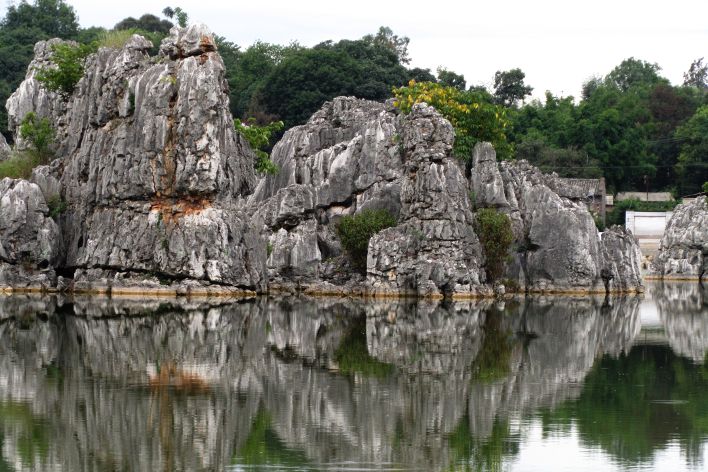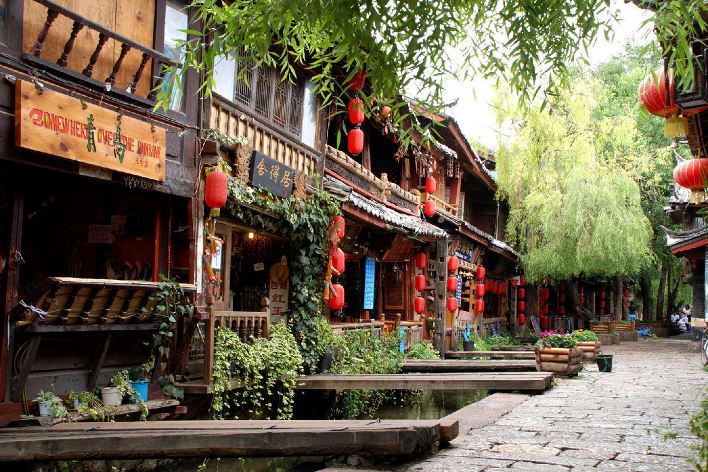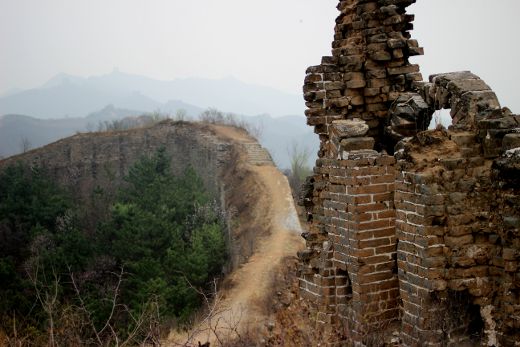
Xuegong Jie (学宫街) and Laodaoqian Jie (老道前街) are two small streets in the Huangpu District of Shanghai.
The streets are packed, full of life. There are low houses, street food, and there’s no lack of bicycles and electric bikes that weave through passersby and merchants. But what makes it special is that the two roads house a beautiful temple: the Temple of Confucius in Shanghai (文庙).
The temple seems out of place with the liveliness of the area that surrounds it, there’s just a small sign outside, the ticket counter consists of two holes in the wall before the temple, there’s a guard at the entrance who also handles the tickets, and for those coming from Hunan Nan Road it’s hard to find the entrance amid the small roads.
Fortunately the tourist guides haven’t forgotten the temple, and when reading about which were the best attractions in Shanghai, not only did I learn about the existence of the Temple of Confucius, but also its details: every Sunday there’s an extraordinary used book market held here.
An entrance ticket costs 10 Yuan, but to walk among the stalls of used books that invade the temple all you’ll need to do is buy a ticket for the symbolic price of one Yuan.

The history of the Shanghai book market
The book market began in the 80’s. Shanghai had no place where booksellers could gather and sell books, so at the initiative of some publishing houses, taking the small used book markets of European cities as an example (especially the green kiosks along the Seine in Paris), they decided to start the book market.
China had finished its cultural revolution not long before, and during this period of great change and disorder, selling and buying books was a very delicate thing. Many books (especially Western ones) were prohibited in China during the revolution, there were few bookshops, and therefore during the 80’s there was a renewed interest in the book market.
Initially the market was held only on days of major Chinese holidays, and the publishing houses sold books for discounted prices. Slowly the market grew, and besides the publishing houses, anyone who had books to sell could get a stand near the temple.
Since 1993 the market has been held every Sunday, by now the publishing houses no longer use the temple to sell books: this is essentially a used book market, and other than books you can also find little statues, comics, calligraphy tools, and more.

My Sunday at the book market
One Sunday in November I decided to take a tour of the market, I left the house early, around 7, having read that the market opens at 7:30 in the morning and closes at 16:30, but to find good opportunities you need to be on time and not wait for a collector to beat you to them.
I got to the temple full of expectations, hoping to find a good book from a nice bookseller who I could chat with. I can say that I was fully rewarded by the beautiful atmosphere that I found there.
Once through the main entrance to the temple, you enter a large courtyard where you can access the temple, here there were a few men seated on stools completely absorbed in their reading, and after the courtyard you’ll find yourself in a large, noisy open space full of books and people.
The atmosphere is incredible: stands everywhere, both on the sides of the courtyard and in the center. I started by taking a look at the books in the stalls and there’s a little of everything: the classics of Chinese literature, the four great novels (四大名著) , Western literature, and also comics, DVDs, cassettes and antiques.
I walk with an eye on the various stalls and am struck by the comics in the last stall on the left. I hope to talk a little with the man, but as soon as he sees me he runs away to call his younger colleague who can speak English.
His colleague is Mr. Shi, who kindly shows me all their comics, and kindly explains that Chinese comics, much smaller than ours (they look like a receipt book), are called Lian Huan Hua (连环画) in Chinese, and there are all
types: historic stories, mythology, revolutionary and even comic versions of Western films and legends.

I move over to the eastern side of the courtyard, where I see a stall crowded with people, I get close and here too there are Lian Huan Hua of all sorts. The stalls are run by the nice Mr. Huang, a seventy year old that’s a little anachronistic. I ask a few questions while he shows me a few comics, and when he understands that I’m interested in having more information about the book market, he calls one of his clients, Mr. Zhang.
Mr. Zhang is a frequent customer that never misses a Sunday, who tells me that since the market opened he’s always been there, he arrives in the morning to buy up the good deals and chat with other frequent clients to the market.
I could tell right away that he’s an educated person, his Mandarin is perfect despite his being born and raised in Shanghai, he knows the history of the country and city of Shanghai, and because of this he also knows how things went inside the Temple of Confucius.
“When the cultural revolution began I was just a child, my memories begin near the end, in 1975 when I was eight years old” Mr. Zhang begins telling me, “but do you know about the criticism of Lin Biao and Confucius? Well during that period anything that had to do with the wise man was prohibited in China, and as a result the temple was partly destroyed, and partly used as a shooting range.”
He continues by explaining that the temple’s wings were destroyed then rebuilt, while the central part remained the same; he indicates one of the corridors of the central courtyard telling me:
“Look at those wooden doors, there the red guards once used to practice shooting, then at the beginning of the Eighties the situation changed, the temple went back to its original function and the publishing houses arrived.”
We continue talking, he confirms that the book market was held only three times a year: for the workers holiday, Chinese New Year and the holiday of the republic; since 1993, during the reign of Jiang Zemin, things changed, the market began being held every Sunday. I thank Mr. Zhang, take a picture with the men around Mr. Huang’s stall, say goodbye and leave.
Conclusion
I recommend that everyone coming to Shanghai take a Sunday morning tour of the temple, not just for books, but also to experience the humanity and the kindness of the people that visit there. In fact nobody forced me to buy anything, which is usually what happens in Chinese markets.
Rather, many told me to freely flip through the books and then put them back, and that I wasn’t in any way obligated to buy; as if in some way they were only interested in seeing that there are still people who will come to the market so as to allow them to continue this stupendous tradition.
Photo Credits: Photos by Gianluca Falso




Wonderful article. We were in Shanghai in late September/early October last year, and one morning in the rain I set out walking, determined to find the Confucius Temple. I eventually did and then returned a couple of days later with my significant Shanghainese other to explore further. The temple is beautiful and so peaceful, well worth a visit, along with the surrounding ancient streets of the old city of Shanghai 上海.
Hello Larry, thank you for your comment : )
Cheers
Furio